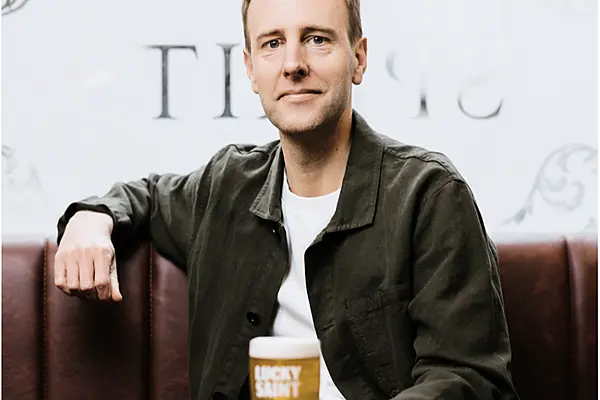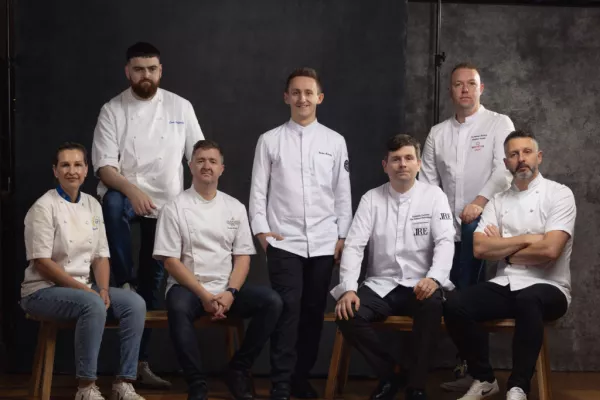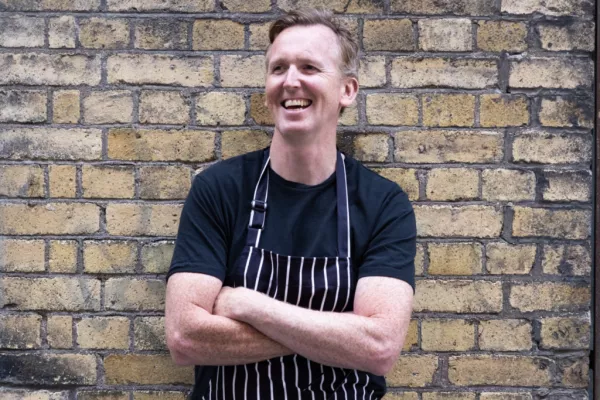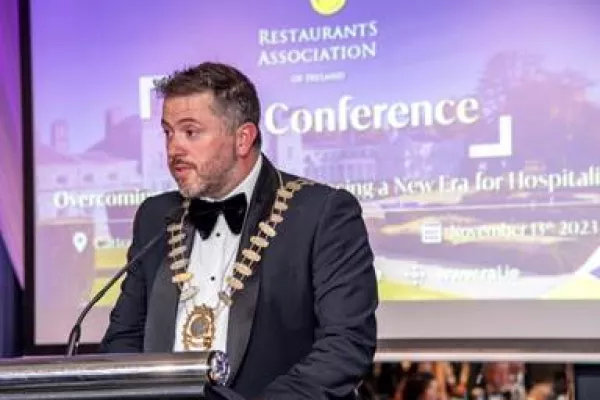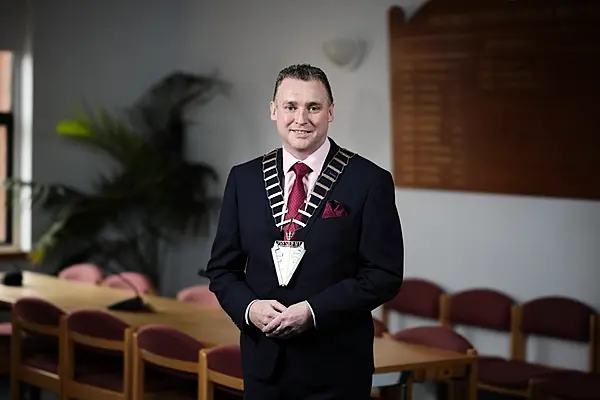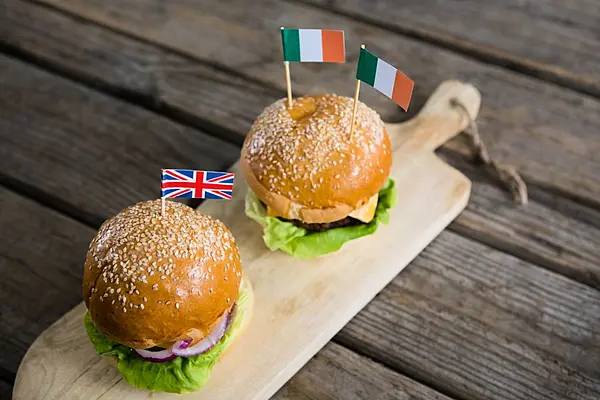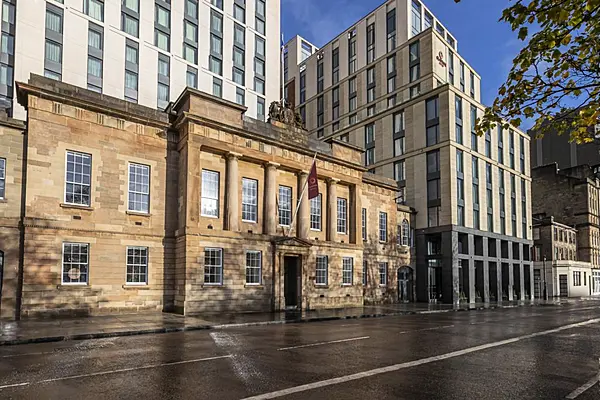As one of the country’s most iconic restaurants, Chapter One, prepares to enter a bold new phase, with a new chef – Mickael Viljanen – coming on board and chef-founder Ross Lewis taking a step back, we celebrate the restaurant’s long and wonderful history by talking to both about what was, and what will be.
This article was originally published in the Summer 2021 issue of Hospitality Ireland Magazine, in July of 2021.
After 29 years at the helm of Chapter One, the legendary Ross Lewis is taking a step back. Was this a long-planned departure, or something accelerated by Covid?
“It was long-planned,” Ross says, “in the sense that I had made my mind up some time ago, pre-Covid. I loved being in the eye of the storm for so many years. I’m very central to the business, and I’m a kitchen guy as well, so I’m running the kitchen. I’m 29 years doing that. What I love about it is that it’s like a stage play: the curtain goes up at nine in the morning, and it closes again at 12 at night, and anything can happen in that time. Most people are attracted to this career because their nature is they love the constantly changing and challenging backdrop.”
However, he says, “I found that there’s a time where, as you get older, the mental energy you need starts to go. As you get older, there is a mental fatigue. Your stamina to stay abreast with all that dwindles. The thing about restaurants is that you are the HR department, you are the PR department, you’re the finance, you’re everything. I remember, I was rodding the sewers outside the kitchen about eight months ago, and a guy came down – a supplier. I had stuff everywhere outside, and he was looking at me, asking, ‘What the f**k?’ I said, ‘Do you think the guys inside are going to do that?’ I was like, ‘Welcome to the world of owning your own business!’”
Furthermore, he points out, “Even the time that you’re off, you’re just recovering, and then you’re going back into work again. Do that for long enough, and you can start to feel fatigue from it.”
Moving Forward
It’s not all about the effort involved over so many years, though.
“The other thing is,” Ross points out, “this is really cutting-edge, and you have to keep moving on. The challenge for me was more about renewing things and moving them forward. Because we operate in very narrow parameters at this level, and even though there is change on the plate – asparagus runs into wild mushrooms, for example – the parameters of quality that you have to operate in are so narrow that you can end up feeling like you’re just doing the same thing all the time.”
Then, he says, “there’s a timing thing. If yours isn’t the energy to be moving everything to take the next step forward—”
Then it’s time to move on?
“Yes.”
At the top end, he says, there isn’t room to stay still.
“There’s fast food, then there’s a massive middle market, which is looking after 98% of customers, so fine dining is only for a few, and the few will be fewer and further between. The top end will have to become increasingly expensive by its very nature – everything handcrafted, with huge inputs of labour and cost infrastructure.”
The customers for restaurants operating at the highest level, he points out, are people who travel frequently, visiting wonderful restaurants all over the world, and are, therefore, instinctively demanding.
“I remember Patrick Guilbaud was saying to me, ‘Ross, you know, if you notice that your chairs are threadbare in the restaurant, then it’s too late because your customers have already seen them.’ You are,” he continues, “investing massive amounts of your time, massive amounts of your energy, and massive amounts of money back into the business. It’s like being on a carousel doing 90 miles an hour – and I loved being on that carousel when I was 25 and 35, and 45, but in your fifties, you look at the runway left in front of you, and you go, that’s a lot shorter than the one behind me, and at the end of the day, you start thinking, ‘How do I want to spend that time? Do I want to be on this carousel doing 90 miles an hour, or do I want to be the guy taking the money to come into the funfair?’ So, for me, it was like, I don’t want to exit Chapter One because I always hoped that there would be another life for it, after me, and in accordance with the way I see the market going, then I need another energy in there.”
Did he ever think of moving more into the middle ground, bringing the restaurant down into mass market?
“No, because we weren’t in the right location, but, also, my nature is that I like to do things well. My thing was always that if my name is over the door, I want to be there to guarantee that exchange of quality. If people are coming in and paying good money, then I want to be sure of what they get, and I’m going to be committed to doing that. All the sacrifices I made in my life in terms of time with family, time with friends, not going places – that was sacrificed for the betterment of the restaurant.”
Throughout the years at Chapter One, Ross says, “we’ve always felt we had to offer more of a welcome, a better exchange, better value for money – all those kinds of things – because we’re trying to drag people away from the centre of the city, where there are plenty of restaurants. That has defined our ethos – the underdogs on the outside, working harder to stay up with the big boys. That was always our motivating factor, and because of that, there has always been money put back in over the years – an awful lot of money – and I always felt that, ultimately, Chapter One could go in a direction that would enhance what we had always done.”
And then?
“The solution to the problem just came along.”
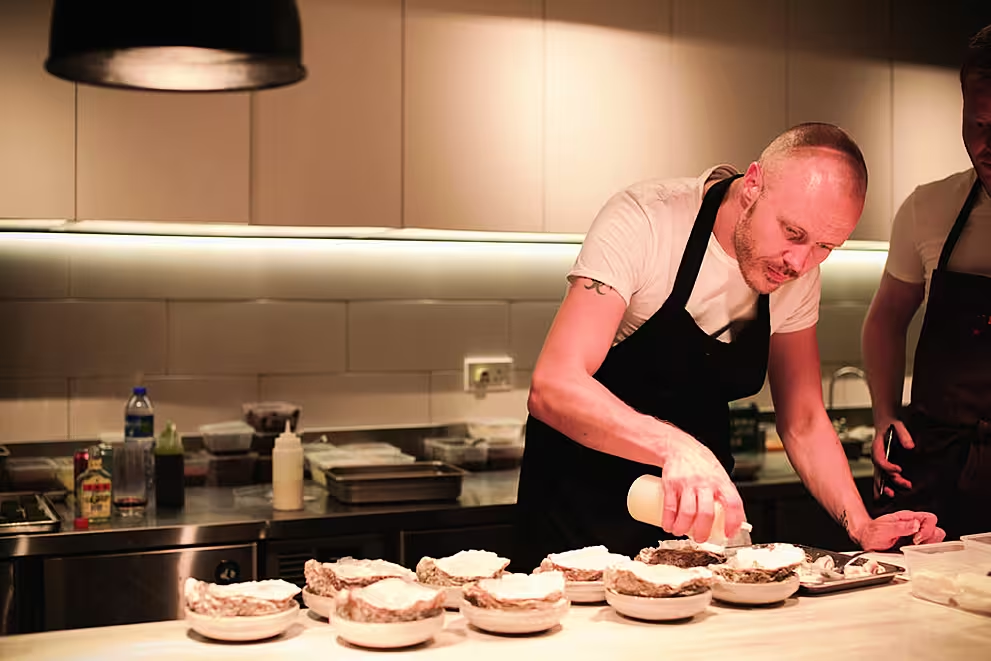
Mickael Viljanen
Enter Mickael
How did the deal with Mickael Viljanen come about?
“Well, I wanted to divest and spend less time in the kitchen, and he wanted to invest and spend more time working for himself for the next ten years. For me, it was like, OK, so this is good. I can step out of the kitchen, which frees me of that huge block of pressure, and I can use my skill set to channel the new business forward, into becoming the best version that it can be.”
Meaning, then, that Mickael can be free of doing that and concentrate on the kitchen, knowing that Ross is overseeing the overarching strategic development?
“Yes. Honestly, you could spend eight or ten hours a day in Chapter One, running the business, without even going into the kitchen. There’s a huge wine cellar, wine lists, PR, there’s HR, there’s banking and accountants, and all of that, and now the added pressures of social media, and so forth. They are all time-consuming jobs, and I happen to be able to deal with them. That’s fine – I’ve developed a knack of being able to do it – but I suppose the truth of it is, really, that you just have to prioritise how you spend your time, and for me, this is the ideal way.”
So, he will also be able to spend more time at Osteria Lucio, presumably. Will he divide his time equally between the two?
“Yes. Once I get Chapter One established and up and running,” he says, pointing out, “Inevitably, it’s going to be a somewhat different restaurant.”
Will that be hard for him?
“I suppose it will take some getting used to, but I have reconciled my mind to the fact that that’s the way it is. I’ve made the decision to divest, so I have to accept the changes that come with that. I’m sure some people will be saying, ‘Oh, Jesus, he’ll be in the kitchen,’ but no, I won’t.”
He reckons that he’ll be able to switch off …?
“Yes. It was very clear from the start. The parameters of how we run it, going forward, have been discussed ad infinitum a number of times, and you can’t make a business agreement and then decide otherwise. That’s not going to work.”
Good fences make good neighbours, I say.
“It took me a while to work through all these things and make my mind up, as to whether it was the right move forward. You don’t just decide overnight. I’ve known Mickael for 15 years, and I’ve seen him mature, and I’ve seen his food mature to a place where I think it’s like a more refined version of what we do.”
So it makes perfect sense?
“Yes.”
What obvious new changes will there be?
“The new restaurant is going to have fewer seats. It will go down from 87 covers to 60.”
Is that a Covid thing?
“No, it’s a new-direction thing. It’ll be more expensive, and it’ll be more bespoke. We’re doing an interior job on both restaurant rooms and the entrance hall. We did the private room from top to bottom. We just finished it when we closed down last March, so that’s been redone into what’s now called the Midleton Room, which has a full collection of Midleton whiskey, from 1984 to 2020, for sale by the glass. There are only a very small number of those collections. We built a beautiful cabinet to house it.”
So, presumably the market will change slightly? The customer will change?
“We are obviously doing everything we can to make sure that our existing base of customers – who are just the best in the world – remain with us. Honestly, we have some incredible customers. When we look back over the history of Chapter One, we still have people coming to us who came in the very early days. We are doing our very best to retain that sense of informality, friendliness, banter, with the staff.”
So, Chapter One isn’t suddenly going to go all austere and highly formal …?
“Do I look stupid, Emily?’ is Ross’s carefully considered response.

Interior, Chapter One
Seasoned Professional
So, what is his view – that of a seasoned professional – around what will happen in the industry over the next 18 months or so, as we get back to normal?
“I think a couple of things. I think that the restaurant industry is a very resilient industry, and no matter where you are in the world – even places where the economy is terrible are full of restaurants. Restaurants dial up and dial down very quickly because they’re about a transient, flexible workforce. They are mostly young, very mobile people who hop from country to country. So, in bad times, times of recession, they go somewhere else, and in good times, they’re there. It dials down and dials up pretty quickly, so I think that the city centre will take a couple of years to recover. Dublin city centre is going to take a good hit, certainly in the short term, because it’s really based on people being in offices and tourists being around – and when you add those two together, that’s what fuels the streets – but I think it will recover, for sure, because everything always does. Nothing is ever as bad or as good as they say it will be, but, that said, I think there’s going to be a significant amount of damage when the government takes away the subsidies.”
A Note of Caution
He sounds a note of serious caution around the void in a particular type of skill set, saying, “Established professionals in their thirties and forties who have now gone to other industries – that’s going to be hard to replace. Some of those people, we need them in the industry because the industry doesn’t have enough people with the experience and maturity to train other people. If they go, you’re breaking that link, and then who has been coming into the industry in the last two years? Nobody, so where do we go with that? There are no apprentices any more. The industry is in crisis, even though it still goes from strength to strength, but I think that’s going to be the very unpalatable legacy of Covid for our industry,” by which he means that those people who have been so scarred by the impact of Covid – specifically on the hospitality industry – are unlikely to leave whatever industry they’ve moved into and come back.
“People need to know their north, south, east and west,” he points out, “and there will be people who think, if I go back into the industry and it closes again, and we’re back in the same boat …? How long is it before that comes out of our psyche – the memory of having been locked down for a year, almost a year and a half? The analysis of this will go on for years.”
When does he think this damage will hit?
“I hear people in the industry saying to expect a downturn equal to about 70% of 2019. Now, that’s a big hit. If we get through this year, subsidies end, and you’re at 70% in 2019, can 100% of restaurants survive? I think, if it happens, it’ll be quick and hard, but I do think that Dublin will recover. I think the economy in Dublin is going to be very good over the next couple of years, but I think this period is going to be really hard for our industry – very unpalatable. When we get past it, whoever survives will rise again from the ashes. Premises that are unoccupied will be occupied by new young chefs, and so forth.”
Does he feel that there is still a market for a vibrant food and eating-out scene? It was certainly very interesting to see the appetite for restaurant food, even in lockdown.
“One of the memories I’ll take with me for the rest of my life is the overwhelming gratitude people had to be coming back into Chapter One and enjoying the food and the hospitality when we reopened in July and August, and then December. I came up in the industry in London in the 1980s, in New York – both places where the restaurant industry was a large part of people’s lives – and it was an older industry in London and New York, with restaurants going back to the 1930s, forties, fifties – they had a very, very established industry. Our industry really only started really defining itself about 15 or 20 years ago. Before that, when I came to Dublin, you had a handful of restaurants for people who had family wealth, but going to restaurants has become part of our habit in the last 15 years – are we really a grown-up industry now? – and the kind of acknowledgement from the people who were coming into Chapter One left us in no doubt of how important restaurants are in their lives. That was just overwhelming – one of the most special things I will take out of Chapter One, for sure.”
Had Covid not come along, might he be looking at the world differently now?
“Maybe, but it gave me an opportunity to reassess my own personal situation, and it gave me a taste of what family life could be like, and I decided I didn’t hate it!” he laughs. “Everyone loves the weekends for a reason – because they work hard during the week – and you need that, too. I know what I need in life, but I just need a little less of the pressure. I need a challenge – I’m a challenge-based person – but, certainly as I get older, I need to prioritise my time to be able to do some of the things that I want to do myself.”
Will he travel?
“I’m going to have a lot on my plate, initially, but, after that, I do have a cigar box at home that holds clippings I’ve torn out from all the publications I’ve read over the past four years. I’m going to the ice-cream festival in Palermo. I’m going to make sushi in Japan, eat tagine in Morocco. I want to go to Vietnam – a culinary tour of the world, everything linked by food. My dream is to go for a good period of time and take different people on different legs, and eat all those amazing dishes.”

Mickael Viljanen came to Ireland in 2000 and worked with Paul Flynn at the Tannery before spending five years at Gregan’s Castle. He moved to the Greenhouse in 2012, where he won his first Michelin star, in 2015, and a second star in 2019. Over the years, he has travelled extensively, to Hong Kong, Scandinavia, the UK, and beyond, and he is a chef ambassador for the Krug champagne house.
How did the Chapter One idea come about? Why did you think it was time to change from the Greenhouse?
“I’ve been working for other people for the last 20 years, and I really felt that now is the time to do my own thing. I don’t think I could have done it earlier, and if I don’t do it now, I may end up never doing it at all. The timing of this just feels right. Working with Ross will be a great way to ease myself into being chef patron for the first time. Learning with the best is always the best place to start.”
What are your plans for Chapter One?
“We are in the middle of a full refit of the restaurant. We will have 50 covers, plus private dining for ten guests. It will look quite different, but with even more comfort and space from there being slightly fewer covers. Food-wise, we’ll be building on what we’ve done so far. It will be the style that my customers know me for, and the ethos of Chapter One, but, for me, having a bigger kitchen and more space is liberating. It means we will have more choice on our dinner menus to start, which I hope everyone will look forward to.”
What do you think will happen in the Dublin restaurant scene in the next year?
“I’d expect there will be an initial big surge, due to pent-up demand, although I’d imagine there could be a dip again next year. I do think the recovery will be quick, though, especially as international tourism and travel returns.”
What are the greatest challenges right now?
“Staffing is a huge challenge, and finding the right staff with the required skill sets. One of our priorities will be to invest in ongoing training. We have lots of work planned in this area, to ensure we have highly skilled personnel.”
What are the potential opportunities?
“If you are performing well and looking after your staff, the opportunities are limitless. A key for us is that there is continuous development and improvement – that every day we get better, every week we are better than the previous week. Pre-Covid, Ireland’s hospitality industry was continually improving, and there is huge potential for us as an island to become better known as a country to visit for great restaurants, known internationally for our dining and eating experiences.”
How was the last year and a half for you, personally?
“There was both good and bad to it, like with most of us. I’m used to working, so it was a shock to the system to be sitting at home. On the plus side, I’ve never seen my children as much, which was brilliant, but I really missed the work. I love and enjoy it. My work is more than work – my hobby and my work are the same thing – so going without it was very hard. I also missed eating out in other chefs’ restaurants myself, eating other people’s food, but I found more time to do other things, too, that I wouldn’t have otherwise done.”
What are you most excited about right now?
“I’m just really excited to get my head down in my Chapter One kitchen and start cooking again.”
What is your food inspiration?
“My food inspiration is as simple as the produce I have to work with. Outstanding produce inspires me, using the best-possible ingredients and doing what seems like minimal work to them, so that there are maybe only two or three elements on the plate, but that those elements just blow your mind. I’ve always said the best dishes are some of the most deceptively simple, and something that seems simple may have taken lots of work to get it there – to build layers of flavour, to really emphasise and enhance – but you have to first start with the best. You can’t make a silk purse out of a sow’s ear.”
CHAPTER ONE AT A GLANCE
OPENED in: 1992
COVERS: Currently 50 in the main dining room, with 6 in the private dining room
STAFF: 36
Read More: Hospitality Ireland Summer 2021: Read The Latest Issue Online!

